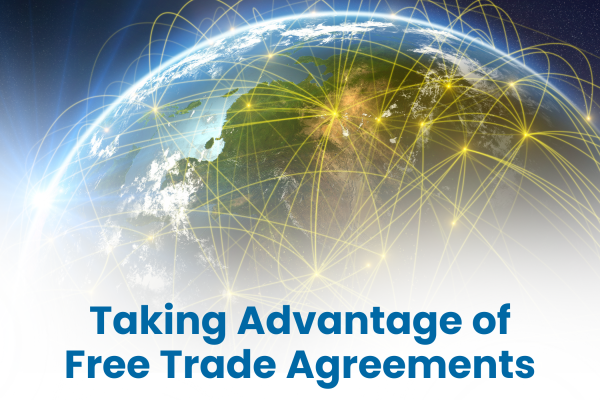Australia has eighteen Free Trade Agreements (FTAs) in place and they have practical benefits for both importers and exporters. Here at Colless Young we make it our mission to ensure you take full advantage of them.
FTAs are treaties between two or more countries designed to reduce or eliminate trade barriers, to the advantage of each country involved. The most common barrier is where a country imposes tariffs or duties on imported goods as a form of protection.
Australia has 18 FTAs in force with 30 economies and we are still in the process of negotiating more.
The current deals consist of 14 bilateral agreements with:
| Chile | China | Hong Kong |
| India | Indonesia | Japan |
| Korea | Malaysia | New Zealand |
| Peru | Singapore | Thailand |
| the United Kingdom | the United States of America |
These also include 4 plurilateral agreements:
| the ASEAN-Australia-New Zealand Free Trade Area (AANZFTA) |
| the Comprehensive and Progressive Agreement for Trans-Pacific Partnership (CPTPP) |
| the Pacific Agreement on Closer Economic Relations (PACER) Plus |
| the Regional Comprehensive Economic Partnership (RCEP). |
Benefits for importers
FTAs offer a number of benefits to Australian importers. With reduced or eliminated duties, your business can take advantage of lower importing costs and therefore price your domestic offerings more competitively (or – make a higher margin). FTAs can benefit your customers by providing increased access to a larger range of better value goods and services.
Things for Importers to watch out for:
Check the origin of the goods to make sure your imports qualify.
When importing products from a country that has an FTA with Australia, you’ll need to meet the rules of origin to get preferential treatment. For instance, manufacturing goods that use materials sourced from different countries may not be covered. So, if you import products from Singapore, for example, but the majority of the product’s components are actually from a country without an FTA, they may not qualify.
Review your supply chain.
As an importer, your goods may not be covered under a Free Trade Agreement if your supply chain includes a:
– Distribution centre.
– Third party processing outside of your free trade country of origin.
Take a close look at the wording of each particular FTA to clarify any product specific rules.
Don’t forget to obtain a Certificate of Origin (CoO).
For goods from certain countries, you’ll need a Certificate of Origin by an authorised body (or the manufacturer) to be covered by the FTA.
Benefits to Exporters
FTAs work both ways, meaning tariffs and duties are also reduced for Australian exporters. They can provide a competitive edge for Australian businesses to do seek new opportunities in overseas markets.
Things for Exporters to Watch Out For:
Classify your goods correctly:
To pay the right tariffs and get your goods cleared at customs, use the correct commodity code to classify your goods. You need to classify your goods using the Harmonized System. These codes, also known as HS codes, are internationally recognised product codes. HS codes provide a standard way to identify and describe goods across different countries.
Understand Rules of Origin:
Where goods come from is an essential part of FTAs. Rules of Origin can be complex, with different agreements or interpretations between jurisdictions.
Understand shipping and Incoterms
Transport can affect the origin status of goods. You need to understand how Incoterms® help establish contractual terms as part of FTAs.
Have the right documents:
To get FTA tariff preference at the border you’ll need appropriate certification documentation. This may include a Certificate of Origin (CoO) to confirm where your goods were grown, produced or manufactured.
Common export documents include:
– Export Declarations for the Australian Border Force
– security declarations for goods sent by air
– Certificates of Origin to prove where your goods are from
– documents that certify specific types of goods or processes.
Requirements vary, so check carefully. If you don’t have the right documents when exporting, you could face fines and delays.
Our staff understand Free Trade Agreements and, as your agent, we are here to guide you through the process of importing and exporting.
For more information about FTAs, talk to us here at Colless Young.
Contact Andrew, email enq@collessyoung.com.au Tel: +61 7 3890 0800.

